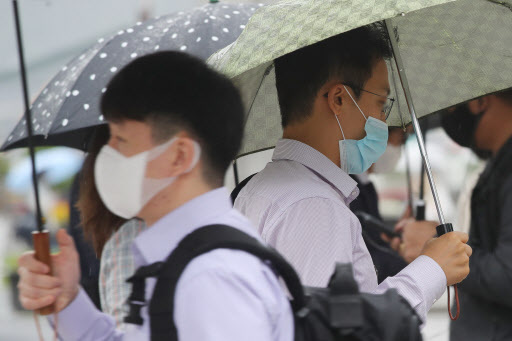Though outbreak has peaked, masks becoming mandatory in Korea
By Korea HeraldPublished : May 17, 2020 - 19:22

Even at the peak of the novel coronavirus outbreak in February, masks were not mandatory in South Korea. But as the country struggles to navigate an exit from the public health crisis, face coverings are increasingly becoming a legal mandate.
On Sunday, Incheon became the latest municipality to require all passengers on mass transit to wear masks, following in the footsteps of the capital.
“This is to protect our community from the dangerous virus. We urge all citizens to wear masks on public transportation,” Lee Jeong-du, a city official, said. He added that the measure would last until the nation lowered the national infectious disease alert, which is still at its highest level and has been since Feb. 23.
In Daegu, which in February counted hundreds of new infections daily, masks have been mandatory in all public places and on public transportation since May 13, when the number of new cases per day had already decreased to fewer than five.
“Ninety-nine percent of citizens abide by health authorities’ advice. But the defiant 1 percent could still spread the virus to our communities,” Daegu Mayor Kwon Young-jin said in response to civic groups that called the order “excessive.”
Not only are masks becoming mandatory, but Korea has introduced tough new measures over the past few weeks that were not in place at the peak of the epidemic.
Stung by an outbreak linked to clubs and bars in Seoul’s Itaewon neighborhood, which has so far spread to over 168 people, local authorities announced a flurry of aggressive administrative orders such as no outside contact and mandatory testing for those who had visited the places in question.
Seoul, which was among the first to force nightlife entertainment businesses to close and to require those potentially exposed to the virus to get tested, echoed Daegu’s rationale.
“We highly appreciate citizens’ continued support for and participation in this fight against the coronavirus. Still, we cannot help but take a more forceful approach … to protect our community,” Seoul Mayor Park Won-soon said last week, adding that those who failed to comply could face fines of up to 2 million won ($1,620).
Experts say the recent series of actions indicates the difficulty of returning to normal, even after the hard-won success in suppressing an explosive outbreak.
Although the country has taken pride in its “democratic” response to the novel coronavirus, relying on the public’s voluntary participation in social distancing rather than draconian measures, some binding rules and effective monitoring of their enforcement are required, experts said, to help guide citizens in their daily lives.
Preventative medicine professor Choi Jae-wook sees fault in the way the country loosened up all at once, with a long list of vague guidelines under the label “routine distancing” and no system to ensure their implementation.
“By doing so and asking people’s ‘voluntary participation,’ the authorities tossed their responsibility to citizens and business owners,” he pointed out.
Until a vaccine or cure is developed, the country will continue to see small waves of infections, as seen in the latest Itaewon club cluster. And unlike at the initial outbreak during which fear forced people to stick to preventative steps, it is difficult to expect the same level of vigilance from citizens, the pundits added.
Acknowledging the challenge, Jung Eun-kyeong, chief of the Korea Centers for Disease Control and Prevention, said complacency will be the biggest threat Korea will face in its fight against COVID-19 going forward.
“The virus, although not as widely as before, is still spreading among us,” she said in a recent daily virus briefing.
By Korea Herald staff (khnews@heraldcorp.com)
-
Articles by Korea Herald








![[Graphic News] More Koreans say they plan long-distance trips this year](http://res.heraldm.com/phpwas/restmb_idxmake.php?idx=644&simg=/content/image/2024/04/17/20240417050828_0.gif&u=)
![[KH Explains] Hyundai's full hybrid edge to pay off amid slow transition to pure EVs](http://res.heraldm.com/phpwas/restmb_idxmake.php?idx=644&simg=/content/image/2024/04/18/20240418050645_0.jpg&u=20240419100350)






![[From the Scene] Monks, Buddhists hail return of remains of Buddhas](http://res.heraldm.com/phpwas/restmb_idxmake.php?idx=652&simg=/content/image/2024/04/19/20240419050617_0.jpg&u=20240419175937)

![[KH Explains] Hyundai's full hybrid edge to pay off amid slow transition to pure EVs](http://res.heraldm.com/phpwas/restmb_idxmake.php?idx=652&simg=/content/image/2024/04/18/20240418050645_0.jpg&u=20240419100350)

![[Today’s K-pop] Illit drops debut single remix](http://res.heraldm.com/phpwas/restmb_idxmake.php?idx=642&simg=/content/image/2024/04/19/20240419050612_0.jpg&u=)